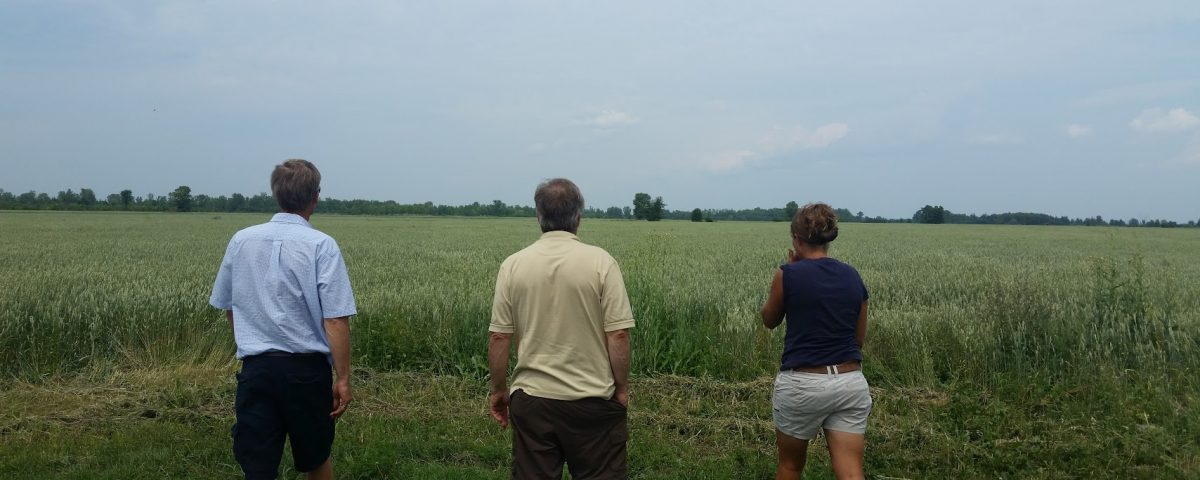- We are closed now (open again on Friday at 7:00 AM). View our up to date menu.
A visit to Quebec

News from the fields
May 12, 2016
Red Hen Baking Company Makes Quality Delights Of All Types
December 5, 2017Every time I have the opportunity to visit Loic Dewavrin at his family farm, Les Fermes Longpres in Les Cedres, QC, I come away from the experience feeling educated, enlightened, impressed, and very fortunate to be a partner with such an exceptional farm.
This July, NOFA-VT teamed up with the UVM Extension Service to organize a tour of the Dewavrin’s fields and their mill with Loic as our guide. We learned about their well-honed organic systems and their continual efforts to take care of the land so that the land can take care of them.
Recently, Jack Lazor, renowned grain farmer, and Joel Salatin, the sage of sustainable farming, have expressed concerns about the sustainability of growing grains in the manner that we typically do around the world today. The unrestrained use of nitrogen fertilizers in the cultivation of grains is largely responsible for the well-publicized dead zone in the Gulf of Mexico. Not only does traditional grain growing require large inputs of fuel to plant, cultivate and harvest; it also pulls large amounts of carbon out of the soil. There is growing evidence that carbon pollution from soil mismanagement is a significant contributor of greenhouse gases. This is being recognized around the world. In fact, France has recently mandated an increase of soil carbon on the nation’s farms in an effort to reverse this trend.

Here you see the remains of last year’s corn crop in between the rows of this year’s soybean crop. Next year they will plant wheat here, with clover interseeded for weed suppression and nitrogen fixing.
Loic and his brothers have similar concerns about the way we farm today. Their interest in addressing these concerns has led them down a path that includes, among other things: devising a sophisticated crop rotation system, using legumes as a primary nitrogen source, inter-cropping and companion planting, keeping all plant “waste” on the fields to decompose, limiting their tillage to only shallow work with a chisel plow, and designing and building custom tractor implements when none were available to make these systems work. These practices have multiple benefits for the farm and the planet. Chief among them -it has allowed Loic and his family to keep their outside manure inputs to just a small fraction of what is traditionally used for organic grains and beans (keeping local waterways healthy). Their system also involves limiting the number of times the tractor is driven over the field in order to minimize soil compaction and reduce fuel consumption.
Touring the fields and listening to Loic describe their approach to farming, I found myself thinking that his approach to farming has some similarities to our approach to baking: It is all about setting natural processes into motion and letting the organisms do the work. We work with flour, yeast, and bacteria; Loic works with soil, seeds and sunshine. Before I carry that analogy too far, I think that it is important to point out that, as bakers, we do not have to contend with the vagaries of weather. Whenever I speak with farmers I am reminded how their jobs are infinitely more challenging than our work which happens inside in a controlled environment.

The Dewavrins weren’t satisfied with traditional manure spreaders so they designed and built this one, which applies the manure precisely where they want it.
All this work that Loic and his brothers do in the field would all be very impressive if it ended right there. But a tour of Les Fermes Longpres does not end in the field. Their sophisticated roller mill allows them to add value to all of the wheat they grow.
The mill was a four year project that included building a new building, travelling to France to dismantle five 75 year old roll stands, rebuilding those stands back in Quebec, building grain and flour storage tanks, installing a bolter (milling terminology for a sifter), and connecting all these parts with an elaborate system of tubes for pneumatic conveyance. Then Loic was able to get to work to educate himself as a miller.

It may look like spaghetti, but each pipe has a particular function as they transport partially milled grain up to the bolters before coming back down for the next pass through the next set of rollers.
We are very proud that 2/3 of the flour they produce ends up as Red Hen bread. We use about 3 ½ tons of their flour each week. It gives me great satisfaction to know that we are able to support such an innovative farm that is doing such important work in demonstrating a new way of growing grains that improves the land it is grown on rather than depleting it.









